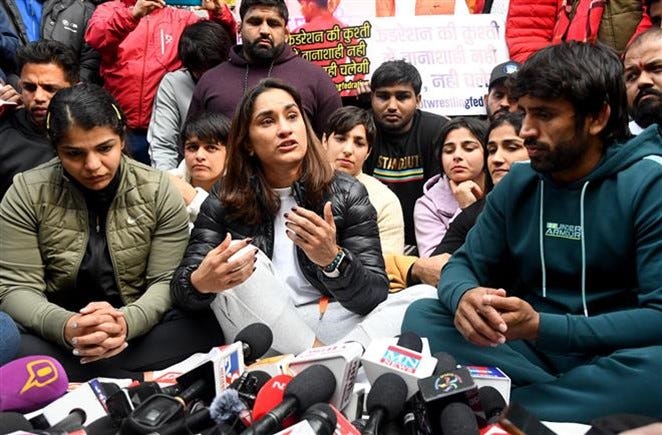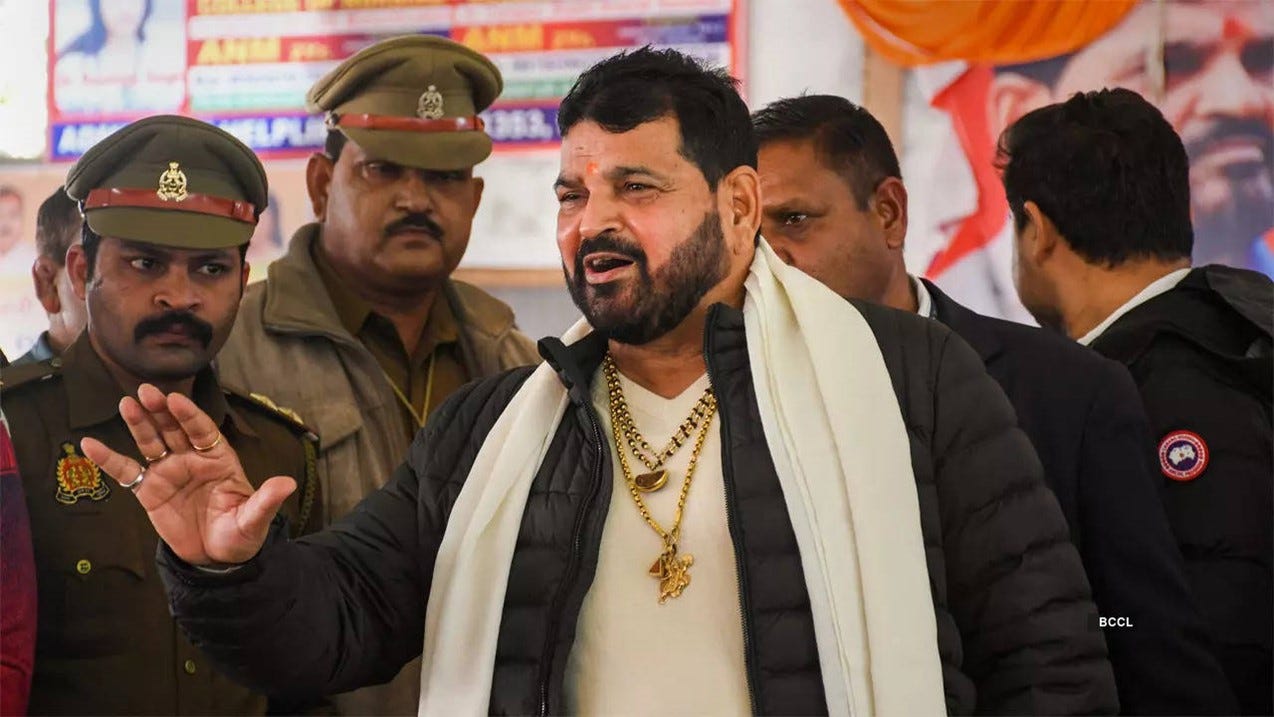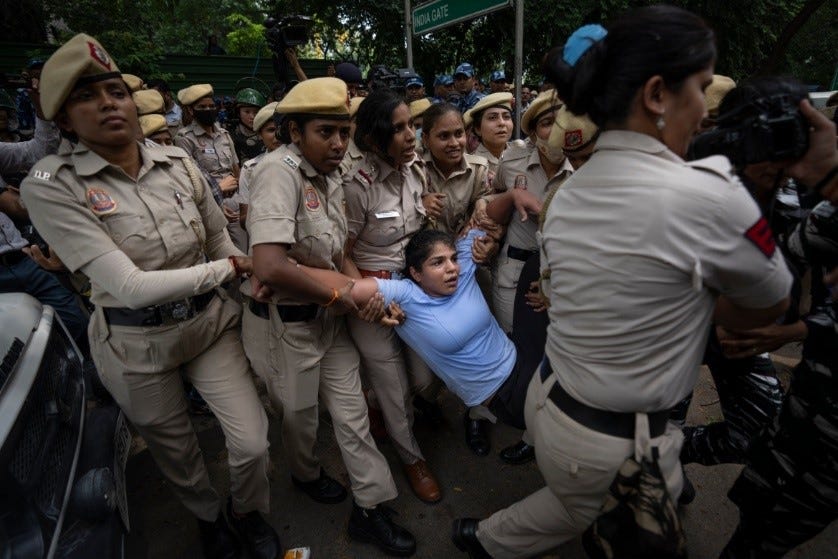Women Olympians’ Harassment Complaints Generate National Outcry
But political leaders on both sides hide over charges against powerful politician
By: Jyoti Malhotra
Prime Minister Narendra Modi’s celebrated slogan, “Beti Bachao/Beti Padhao” (Let the girl-child study), emblazoned across walls and rickshaws and newspaper advertisements during the nine years he has been in power, has become a taunt in the heart of India.
That is because despite a national outcry in their support, seven women athletes have been thwarted for weeks in bringing accusations of serial sexual harassment over nearly two decades against Brij Bhushan Saran Singh, the powerful five-time member of India’s Parliament and president of the Wrestling Federation of India. Many of these women are Olympians and Commonwealth Games and Asian Games medal winners. But there has been no response from Modi.
Nor has there been a response from women BJP leaders like Smriti Irani, in charge of the women and child portfolio, or Nirmala Sitharaman, the powerful finance minister, or Meenakshi Lekhi, the junior minister in the external affairs ministry – not one has come out in support of the women Olympians. They have restricted themselves to obvious comments like, “let the investigation be completed.” Well, it has been several weeks and the report is still not out.
Worse, no otherwise-celebrated Opposition woman leader has really cared to join the protest staged these last several weeks against Singh, a senior member of Modi’s ruling Bharatiya Janata Party. Not Priyanka Gandhi, the powerful Congress leader; or Mamata Banerjee, chief minister of Opposition-ruled West Bengal, who traveled to the disaster site of the worst train accident in decades.
But none have rallied to the cause of these female wrestlers; not the women leaders of southern states like Tamil Nadu, Maharashtra and Kerala, which pride themselves on having far more egalitarian societies -- like Kanimozhi of the Dravida Munnetra Kazhagam, which rules Tamil Nadu, or Supriya Sule, whose father Sharad Pawar is one of the most powerful politicians in India.
But why should this be seen as a woman-only cause? Where are India’s male politicians and activists on the female wrestlers’ struggle? Rahul Gandhi. Sachin Pilot. Jay Panda. Shashi Tharoor. Kalikesh Narayan Singh Deo. Jyotiraditya Scindia. Omar Abdullah. Jairam Ramesh. M K Stalin. Sitaram Yechury. Pinarayi Vijayan. All have been missing in action.
All these men travel the world and have shown themselves to be extremely sophisticated in explaining social and political issues at home and abroad. But none of them have shown the slightest interest in breaking ranks with their own peer group and sitting on the ground alongside these women athletes, who for the past month have slept and eaten on the curbside in the heart of Delhi to hold press conferences.
None of these politicians came out of their airconditioned offices and protested when these women were kicked and dragged by police last week as they were trying to march to the new Parliament – agreed, security guidelines were in place, because the Prime Minister and his entire Cabinet were in attendance – or when, desperate for action, they reached the banks of the river Ganga to immerse their medals into the holy river.
Not one of these men and women stirred out of their Twitter ivory-towers – so comfortable to sit there and sip coffee and belt out 280 characters and think you’ve won the battle on social media. Even the 1983 cricket squad which won the World Cup against huge odds and has since become national sporting heroes, only bothered to move themselves to issue a statement after celebrated commentators like Sunil Gavaskar had completed their assignments at the recent Indian Premier League for, presumably, large sums of money. Virat Kohli still hasn't said a word.
Neeraj Chopra, the world-record holder in javelin throw, issued a statement in support. Like these women wrestlers, he's also from Haryana, the state neighboring Delhi and where these women come from. He obviously understood what it takes to get out from under the shadow of an ultra-conservative society and win against all the odds and scale the highest peaks of sports.
Then rural India came to the rescue. Farmer leaders from Haryana showed up on the Ganga riverbank last week and prohibited the athletes from doing anything as emotional as immersing their medals in the river. They took charge. They displayed compassion. At least partially, they filled in the distressing vacuum.
That’s when the International Olympic Committee and the United Wrestling Federation issued separate statements on hoping the law would be allowed to take its course. The international press began to take notice. On the one hand, they said, India was moving to host a summit of the world’s most powerful leaders in its capacity as head of the G-20, and on the other, sexual harassment allegations are not being properly investigated. The New York Times called it a “shrinking space for dissent” in India.
The criticism may have struck home. This weekend, India’s second most powerful man, home minister Amit Shah, no doubt on directions from Modi, called the protesting wrestlers to his home and talked to them about their protest.
Amit Shah then ordered Sports Minister Anurag Thakur to talk to the wrestlers again – he did, for six hours, on June 7, last night. Meanwhile, the silence continued from civil society activists, who had mounted a fierce protest in December 2012 over the gang-rape of a woman, braving tear gas and water cannons, which had the effect of shaking the Congress government in power at the time.
The seven women wrestlers and a male ally, until a few days ago when they were arrested, have been demanding the arrest of Singh, charging him with serial sexual harassment. The women first complained to the government, and the government did what it loves to do – set up a committee, whose report is still awaited.
Then the wrestlers went to a police station and complained. The cops refused to file a First Information Report (FIR), which basically takes official cognizance of a complaint. They then appealed to the Supreme Court, which directed the police to file the FIR. In the several weeks since, the police have questioned more than 100 people about the matter, but not the man at the center of the agitation.
The women wrestlers broke several social taboos in the two FIRS that they filed – one of the seven was a minor 17 years ago, when Singh sexually harassed her. According to the law, he should have been imprisoned immediately, even before the investigation could be carried out. They detailed how Singh had brushed his hands across their breasts, touched the navel of one of the girls, and sent messages via the physiotherapist promising to provide them with supplements.
After their six-hour conversation with Sports Minister Thakur, the wrestlers have moved in favor of compromise. They will postpone their agitation till June 15, but want the investigation completed. In turn, the government promised that Brij Bhushan Sharan Singh’s family will not be allowed to contest elections to the Wrestling Federation – his son and son-in-law are powerful officials there – that take place later this month. The authorities also offered the athletes a position on the Federation; they have turned that down, so far.
Will the athletes resume their agitation when the case is completed, if the BJP politician is found not guilty and therefore not arrested? What is going to be their stand? Has the government beaten them down to the lowest common denominator of their self-respect? Or will the athletes prevail and ensure that their peaceful protest, in accordance with the best practices taught by none other than Mahatma Gandhi and his satyagraha, arouse the moral conscience of the nation in their support?





